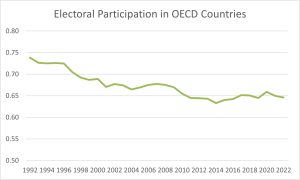Slovakia’s Prime Minister Robert Fico was shot in an assassination attempt on May 15, 2024. The assailant, Juraj Cintula, a 71-year-old man reported by media as a writer and a poet was promptly apprehended. The Slovak Interior Minister later said that Cintula told during interrogation that he disagreed with the Prime Minister’s policies and decided to act.
World leaders condemned the attack and European Commission President Ursula von der Leyen reacted to the incident by asserting that such acts of violence undermine democracy and there was no place for them in European society. Nevertheless, political violence has already made its way into the European society. Violent protests and riots as well as police brutality against peaceful protesters are not that rare in developed nations that are the proponents of civil rights and freedom of speech.
After the First World War, US President Woodrow Wilson (1913-21) made the worldwide promotion of democracy and peace the focus of US foreign policy. The United States is still maintaining that role. But what about the condition of democracy at its home? The US and other OECD countries have a reputation for being strong democracies. These countries possess a civilized democratic culture. The question of rigging an election never arises. The loser routinely concedes defeat and congratulates the winner.
However, in the 2020 election in the USA, incumbent President Donald Trump claimed that the election was stolen and even tried to overturn people’s mandate by orchestrating an insurrection. The USA is heading for presidential elections this year, and Trump is the presumptive Republican presidential candidate. He has already declared in an election campaign rally that if he is not elected then there will be a bloodbath in the country. Is it a reversal of culture or just the idiosyncrasy of Donald Trump? Is democracy on the downslide?
An article from Politico published on May 21 questions whether it’s too late to take steps to strengthen democratic engagement among Europe’s youth. It mentions that multiple surveys indicate that dependable support for democracy in Europe is presently running low and it appears that public endorsement of democracy will further decline.
Using the database of the International Institute of Democracy and Electoral Assistance (International IDEA), an inter-governmental organization providing support to sustainable democracy across the world, if we plot the electoral participation or voter turnout for the last three decades in the OECD countries, an overall declining trend emerges as shown below.

The Economist Intelligence Unit (EIU) has been assessing the quality of democracies around the world every year since 2006. Their method involves creating a Democracy Index that scores countries on a scale of 0 to 10. To calculate this score, they analyze 60 different factors grouped into five main categories: how elections are conducted, the level of civil liberties, how well the government functions, how citizens participate in politics, and the overall political culture.
[… … …]
This article was published in the Daily Sun on May 28, 2024. Please read the full article here or here.

